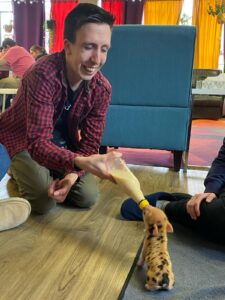Puzzles – Beyond Entertainment
In a world where simplicity meets complexity, puzzles stand as more than just a source of entertainment. They embody a therapeutic tool, a catalyst for growth and empowerment, for people of all abilities, including individuals with and without developmental disabilities. This in-depth exploration will unveil how these unassuming pieces of cardboard and digital imagery can significantly impact cognitive, emotional, and social well-being.
The Cognitive Benefits of Puzzles
Enhancing Cognitive Functions
Puzzles, in their myriad forms, provide a unique avenue for cognitive development. They are not just a passive way to pass time but an active engagement for the mind, offering a playful yet potent way to exercise various brain functions. Puzzles can open a door to improved cognitive abilities, serving as a non-intrusive and enjoyable method to enhance brain function.
Memory Enhancement through Puzzling
One of the primary cognitive benefits puzzles offer is the enhancement of memory. Jigsaw puzzles, in particular, require the recollection of shapes, colors, and patterns. Each time an individual places a piece correctly, it reinforces memory pathways, improving both short-term and visual memory. The repeated action of recalling and matching pieces exercises the brain in a manner similar to muscle memory in physical activity.
Problem-Solving and Reasoning
Beyond memory, puzzles are a fantastic tool for honing problem-solving skills. They require the solver to think logically, plan steps ahead, and adjust strategies as needed. This is particularly evident in complex puzzles where the solution is not immediately apparent, and one must experiment with different approaches. For people of all abilities, including individuals with and without developmental disabilities, these activities encourage thinking outside the box, enhancing their ability to approach everyday problems with improved reasoning skills.
Attention and Concentration
In an age of constant distractions, the ability to concentrate on a single task for an extended period is invaluable. Puzzles inherently demand a level of focus and concentration that can be therapeutic. They help individuals practice maintaining attention on a task, thus improving overall concentration and focus. This skill, once honed, can significantly impact other areas of life, aiding in the ability to complete tasks and follow through with responsibilities.
Emotional and Psychological Advantages
Stress Relief through Puzzling
The act of puzzle-solving has a naturally calming effect, making it an excellent tool for stress relief. The focused state required for solving a puzzle allows for a form of escapism, where daily stressors can fade into the background, offering a much-needed mental break. This aspect is particularly beneficial for those who may experience heightened levels of stress and anxiety. The repetitive nature of fitting pieces together can provide a soothing rhythm that helps in reducing feelings of anxiety.
Building Self-Esteem and Confidence
Completing a puzzle, no matter the size or complexity, is a moment of achievement. For individuals facing daily challenges, these small victories can have a significant impact on their self-esteem. For people of all abilities, including individuals with and without developmental disabilities, the sense of accomplishment that comes with solving a puzzle reinforces self-belief and the ability to overcome obstacles. This boost in confidence can extend beyond the puzzle, inspiring a more positive outlook on personal abilities and potential.
Social Interaction through Puzzles
Encouraging Teamwork and Communication
Puzzle activities, especially when done in groups, can serve as a bridge to enhanced social interaction. Collaborative puzzle-solving encourages communication, sharing of ideas, and teamwork. Participants learn to articulate their thoughts, listen to others, and work together towards a common goal. These skills are crucial for social integration and are particularly valuable for people who may struggle with social cues and interactions.
Building a Community through Shared Interests
Puzzles can also serve as a catalyst for community building. Joining a puzzle club or participating in group puzzle activities can offer a sense of belonging and connection. For people with or without developmental disabilities, this can be a gateway to forging new friendships and feeling part of a community. Shared interests create a common ground, making interactions more comfortable and enjoyable.
Types of Puzzles and Their Suitability
A Spectrum of Puzzles for Diverse Needs
The world of puzzles is incredibly diverse, offering something for every interest and ability level. Traditional jigsaw puzzles come in various sizes and difficulty levels, from large-piece puzzles for beginners to intricate designs with thousands of pieces for more advanced enthusiasts. Word puzzles like crosswords and word searches cater to those with a penchant for language, while logic puzzles like Sudoku challenge reasoning and mathematical skills.
Tailoring Puzzles to Individual Abilities
When selecting puzzles for therapeutic purposes, it’s crucial to consider the individual’s abilities and interests. The goal is to provide a challenging yet achievable task that keeps the individual engaged without causing frustration. For instance, large-piece jigsaw puzzles with vibrant imagery might be suitable for individuals with fine motor skills challenges or visual impairments. Similarly, puzzles with tactile elements can offer a sensory experience beneficial for those with sensory processing disorders.
Practical Tips for Incorporating Puzzles in Therapy
Establishing a Puzzle-Friendly Environment
Creating an environment conducive to puzzle-solving can significantly enhance the therapeutic experience. This means setting up a quiet, well-lit area that’s comfortable and inviting. For individuals with sensory sensitivities, it’s important to ensure the space is free from overwhelming stimuli. A consistent and dedicated space for puzzle activities can help in establishing a routine and making the experience something to look forward to.
Gradual Progression in Complexity
Starting with simpler puzzles and gradually increasing complexity can foster a sense of progression and achievement. It’s important to celebrate each milestone, no matter how small, to keep motivation high. Therapists and caregivers should closely observe the individual’s response to different puzzle types and difficulty levels, adjusting accordingly to provide the right balance of challenge and enjoyment.
Incorporating Puzzles into Daily Routines
Making puzzles a part of the daily routine can provide structure and a sense of predictability, which can often feel comforting for some, regardless of ability level. This could be a short puzzle-solving session every day or a longer session a few times a week, depending on the individual’s schedule and attention span.
Product Recommendations
Puzzle Mats and Boards: These are great for keeping puzzles organized and can be especially helpful for larger puzzles or when puzzle activities span multiple days.
Magnetic Puzzles: Ideal for individuals with motor skill challenges, magnetic puzzles prevent pieces from moving unexpectedly and can be easier to handle.
Puzzles with Diverse Cultural Themes: Offering puzzles that represent different cultures and lifestyles can be a great way to promote inclusivity and broaden worldviews.
Interactive Puzzle Games: Modern technology has introduced interactive puzzle games that can be played on tablets or computers, offering a dynamic and engaging experience.
Customizable Puzzles for Personalization: Creating puzzles from personal photographs or favorite artworks can add a meaningful dimension to the activity, making it more engaging and personal.
Harnessing the Therapeutic Power of Puzzles
The Role of Caregivers and Therapists
Caregivers and therapists play a crucial role in facilitating puzzle activities. This includes selecting appropriate puzzles, guiding the activity, and providing encouragement and support. It’s important for them to be patient and responsive to the individual’s needs, making adjustments as necessary to ensure a positive and beneficial experience.
Measuring Progress and Impact
Tracking progress can be helpful in understanding the impact of puzzle activities. This could involve noting improvements in cognitive abilities, changes in emotional well-being, or developments in social skills. Regular assessments can help in tailoring the approach to maximize the therapeutic benefits.
Piecing Together a Brighter Future
Puzzles, in their simplicity, hold profound potential for therapeutic use, especially for adults with developmental disabilities. They offer a world where challenges can be met with solutions, where every piece placed is a step towards cognitive enhancement, emotional well-being, and social connection. By integrating puzzles into therapeutic routines, caregivers, and therapists can unlock a myriad of benefits, contributing to a richer, more fulfilling life experience for people of all abilities including those with and without developmental disabilities. So, the next time you see a puzzle, remember: it’s not just a game, it’s a tool for transformation, a piece in the puzzle of holistic care and development.




